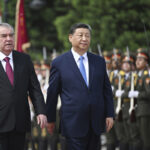The second largest South American economy is once again facing record inflation, while the peso, the local currency, has lost most of its value.
It is a deja vu, to the point where it leaves the international community apathetic.
The economic situation of Argentina, one of the giants of South America, along with Brazil, is alarming.
A few months ago, the world marveled at the country’s victory against France in an epic final of the 2022 soccer world cup. The team was led by Lionel Messi, considered the best soccer player in history. But in the background of this achievement was the sinking of Argentina into a new economic crisis that continues to worsen.
All signals are red. The country is once again overwhelmed by a wave of inflation that began 10 years ago and has gradually intensified. In April 2023, the inflation rate stood at 109%, with an upward trend.
In 2022, Argentina declared an annual inflation of 94.8%, among the highest in the world. The previous record, dating from 1991, marked the end of a cycle of recessions and periods of hyperinflation (3,100 % inflation in 1989, 2,300% in 1990).
It Takes 250 Pesos to Buy $1
The rise in commodity prices has accelerated since the beginning of 2022, in connection to the Russian war in Ukraine. While it has made it possible to sustain Argentine economic growth in 2022, especially since it has been combined with a gradual recovery in tourism and a gradual return of international confidence linked to the signing of a new aid program of the IMF in March 2022, it will also accentuate pre-existing inflationary pressures.
The IMF estimates that imported inflation is high: a 10% increase in food and energy prices could generate an increase in Argentine inflation of around 1.6% over 12 months, with these two items of expenditure representing more than 30% of the household consumption basket.
This economic slump has led to the collapse of the Argentine peso for several months. This year, the peso is down 27.1% against the U.S. dollar. The peso to the U.S. dollar rate was $0.0040 at the time of writing. This means it takes 250 pesos to buy $1. In 2010, the exchange rate was 4 pesos for $1.
The local press indicates that the population no longer trusts the national currency and wish to keep their assets in a stable currency. As the exchange is limited — each person cannot change more than $200 per month — a thriving black market has emerged. U.S. dollars are so coveted that in Argentina people are willing to pay almost twice the official amount to get them, according to the local press.
General Elections in October
In addition, the country lost two new lawsuits in April brought by disgruntled investors. Hedge funds, including Palladian Partners, sued Argentina in London after they encountered losses related to the country’s growth-linked securities. They were challenging the change in the way Argentina calculates its gross domestic product.
In this complicated economic context, the Argentine authorities, led by leftist President Alberto Fernandez, elected in 2019, reached an agreement with the IMF on a new program in March 2022. This, the 22nd in the country’s history, does not solve Argentina’s structural problems, but proposes adjustments to stabilize the economy.
Among the various measures to be put in place, budgetary consolidation, i.e. the reduction of the public deficit, is the first anchor point. This budgetary consolidation would make it possible to limit the financing of the public deficit by issuing money from the Central Bank in order to gradually restore confidence in the country, and to begin, very gradually, to reduce inflation.
The government is also counting on the accumulation of foreign exchange reserves (via the increase in exports) to limit the pressures on the peso and the risk of devaluation.
The Argentine Central Bank is also raising its interest rates.
The government and the IMF are betting on a decrease of the inflation by around 60% for 2023.
The general elections scheduled for October 22, could, however, lead to a reorientation of Argentine economic policies. It is likely, experts say, that the party which will inherit power this year — whether it is the current coalition or a new political group — will seek to renegotiate certain elements of the agreement with the IMF.
Source: The Street
















